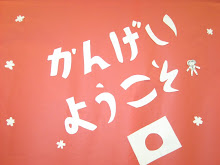Wednesday, May 5, 2010 A Block Two Day
JAPANESE 3 -- First period
This class does not meet on Block One days.
JAPANESE 1 – Fifth period。
Class heard discussion of Children’s Day (previously Boy’s Day), which takes place on May 5th every year in Japan. Guest speaker was Ms. Joy Dickson, who brought display items and handouts to illustrate how the holiday is celebrated.
Don’t forget sentence structure:
Time に Topic/subject は Destination に Traveling Verb
Time に Topic/subject は Direct Object を Active Verb
Homework for Friday is still: flash cards for kinship terms, i.e. vocabulary for family members
Reminder:
Traveling verbs:
いきました、いって Went
きました、きて Came
はいりました、はいって Entered
かえりました Returned (home)
Family words, i.e. kinship terms:
ちち、おとうさん、おかあさん、おばあさん
New adjectives, and in the past tense!
あたらしい です。 あたらしかった です。Is new. Was new.
あつい です。 あつかった です。 Is hot. Was hot.
たのしい です。 たのしかった です。 Is enjoyable.
Was enjoyable.
Be sure to register with Japanese site on Moodle。
JAPANESE 2 Sixth Period
Class heard discussion of Children’s Day (previously Boy’s Day), which takes place on May 5th every year in Japan. Guest speaker was Ms. Joy Dickson, who brought display items and handouts to illustrate how the holiday is celebrated.
Three patterns:
__て も いい です か。 May I? Is it OK to?
はい、__て は いい です。Yes, it is OK to…。
いいえ、__て は だめ です。No, it is forbidden to…
Started Lesson 7 in 2 Kimono – buying and selling things. Listened to manga dialogue and repeated.
Homework postoned to Friday:
1. write dialogue in English
店のリスト
でんき屋 Quinton
パン屋 Camille
ペット屋 Nora
本屋 Alice
くつ屋 Ed
じどうしゃ屋 Jason
ぶんぼうぐ屋 Betty
おもちゃ屋 Gavin
おかし屋 Nicole
デパート Perry
きっさ店 Ami
ようせき屋 Martina
八百屋 Darren (やおや)
はな屋 Dashona
Ray hasn't yet chosen a shop.
Indicate new kanji for this lesson:
店 みせ
store or shop or place of business -- a noun that can stand by itself
屋 や
this kanji never appears alone, but only in combination with other kanji – often used as a suffix to indicate “store”
Be sure to register with Japanese site on Moodle。
Reminder: We all must be polite in the Japanese language classroom. Not only is it important in our lives in general – it is an essential part of Japanese culture. ください、おねがい します、ありがとう、すみません Are the most important words and phrases in Japanese.
JAPANESE 4 and AP – Seventh period
Pages 168 and 169 (short Cultural Perspective Presentation) – Japanese Houses) in “Strive for a Five”、prepare to give a 2 minute speech
The following students gave their speeches: Amy Z., Tommy Y., Azriel W., Johnny Cheng, Jenny J.
The following students gave their presentations this past Monday: Connie Y., Lalita A., Mike S., Elizabeth A.
AP Students worked further with items from “Strive for a Five” – reading, listening portions. Also listened to CD of sample student efforts in answering AP questions
AP Japanese test will take place on Thursday, May 6th, beginning at 12 noon, in the computer lab in room 114.
Jpn 4 students read two folktales 昔話(むかしばなし)so that they could begin to think about the original childdren’s stories (which must be illustrated) of similar (or longer) length that they will be writing for their final projects.
[“Individual Assigned-Topic Presentation should be 4 minutes long – they are big topics. AP and 4th year people should supply Japanese vocabulary lists to everyone in the class. Students may speak from notes, but not from text-with-sentences.”]
Cultural topics chosen for major presentations – 四年生の日本語の生徒、英語で(But with 単語のリスト)――AP の生徒、日本語で (単語のリスト)
Jenny J. – “Self, family, and friends”
Connie Y – “leisure – traditional arts, hobbies, and sports)
Tommy Y – “Nature and environment”
Amy Z – “School and education”
Mike S – “Clothing, 和服、洋服)”
Azrieal W – “Communication and media”
Elizabeth A – “Technology – internet, private and public phones, cell phones”
Lalita A – “Rites of life – weddings, funerals, gift exchanges, letters”
Anton H – “Transportation – Japanese trains, buses, bicycles, cars”
Johnny C – “Shopping – kinds of stores, vending machines, Jpn money”
Jerome M – “Folklore, traditional culture, legends and stories”
About Me

- O.Kimeru
- M.A. 1992 from U. of Chicago; Japan Foundation Fellow in 1987-88; research fellow Yokohama City University; Japanese language teacher since 1991; also taught French (member American Association of Teachers of French), English as a Second Language (to students), methodology of teaching ESL (to Japanese high school teachers), English, Japanese history/culture, drama; in 2002 and 2004, listed in Who's Who Among America's Teachers; member of Chicago Sister Cities Osaka Committee, and chair of its Education Sub-Committee; vice-president Illinois Association of Teachers of Japanese; Payton H.S. World Language Department Chair from 2003-2007, under founding principal Mrs. Gail Ward; taught Japanese and coordinated Japan Exchange at Payton from 2003 to 2010; Japanese teacher at Burr Public School beginning August, 2010
Followers
Blog Archive
-
▼
2010
(88)
-
▼
May
(20)
- Japanese 2 June Review (work in progress)
- Japanese 1 June Review (work in progress)
- Japanese 3: June Review (work in progress)
- May 28, 2010 An Eight Period Day
- May 27, 2010 Seminar Day
- May 26, 2010 A Block Two Day
- May 25, 2010 A Block One Day
- May 24, 2010 An Eight Period Day
- May 21, 2010 An Eight Period Day
- May 19, 2010 A Block Two Day
- May 18, 2010 A Block One Day
- May 17, 2010 An Eight Period Day
- May 13, 2010 An Eight Perio...
- May 12, 2010 A Block Two Day
- May 11, 2010 A Block One Day
- May 10, 2010 An Eight Period Day
- May 7, 2010 An Eight Period Day
- May 5, 2010 A Block Two Day
- May 4, 2010 A Block One day
- May 3, 2010 An Eight Period Day
-
▼
May
(20)